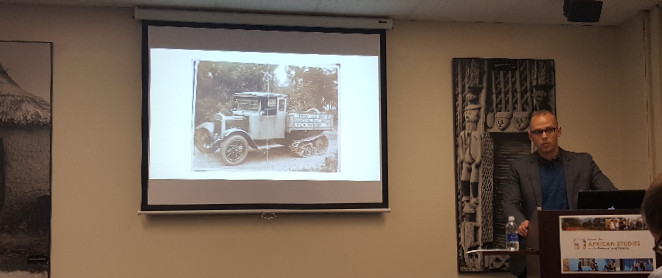 On Friday November 18th, Dr. Joshua Grace gave a Baraza presentation titled “African Motors: Garages, Oil, and Austerity in Tanzania.” Dr. Grace is Assistant Professor of History at the University of South Carolina. The talk, derived from a near-complete book manuscript, focused on the history of the auto repair industry in pre-colonial, colonial, and post-colonial Tanzania using archival research, ethnographic methods, and over 60 interviews with mechanics to connect history to the present era.
On Friday November 18th, Dr. Joshua Grace gave a Baraza presentation titled “African Motors: Garages, Oil, and Austerity in Tanzania.” Dr. Grace is Assistant Professor of History at the University of South Carolina. The talk, derived from a near-complete book manuscript, focused on the history of the auto repair industry in pre-colonial, colonial, and post-colonial Tanzania using archival research, ethnographic methods, and over 60 interviews with mechanics to connect history to the present era.
Grace’s presentation provided an at times romanticized and at times structural narrative of car culture and the limits and possibilities of invention, production and technological power in Tanzania. At the individual level, car repairs and maintenance, as Grace explains, are creative processes. At a broader understanding, car repair and mechanical maintenance is also political maintenance.
A reoccurring theme from the colonial era is the juxtaposition between those who believe car repair has to be learned through formal channels versus those who know that comprehensive expertise is not possible and experiential expertise is of greater value. The common trope is using your mind to innovate a solution, which gives car repair mechanics who succeed in this way a level of ‘street credibility’ for their ingenuity.
In the 1910’s and 1920’s, car repair occupied a temporary space and repair garages were makeshift centers, in part because colonial Tanganyika preferred investing in railway transport. In the 1920’s and 1930’s, the growing number of cars on the market meant the colonial government put a limit on which would be imported into the colony. By the 1960’s and 1970’s, the socialist state began to look upon car garages with suspicion and considered them to be anti-socialist. While the state saw these garages as a graveyard for cars, young men saw them as a source of wealth and security.
Finally, in the final portion of Grace’s presentation, he connects the auto repair industry to the oil industry in Tanzania. The connection is strongest in the sense that moving oil is the greatest obstacle to harnessing its political power. Moving oil and fuel within the country became a problem for car transport, which resulted in famines in different areas.
